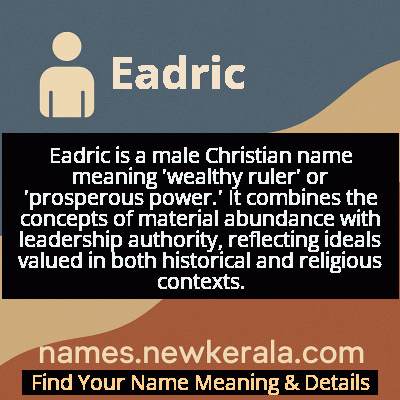Eadric Name Meaning & Details
Origin, Popularity, Numerology Analysis & Name Meaning of Eadric
Discover the origin, meaning, and cultural significance of the name EADRIC. Delve into its historical roots and explore the lasting impact it has had on communities and traditions.
Name
Eadric
Gender
Male
Origin
Christian
Lucky Number
4
Meaning of the Name - Eadric
Eadric is a male Christian name meaning 'wealthy ruler' or 'prosperous power.' It combines the concepts of material abundance with leadership authority, reflecting ideals valued in both historical and religious contexts.
Eadric - Complete Numerology Analysis
Your Numerology Number
Based on Pythagorean Numerology System
Ruling Planet
Uranus (Rahu)
Positive Nature
Strong sense of order, loyal, practical, and disciplined.
Negative Traits
Stubborn, overly serious, rigid, and prone to feeling restricted.
Lucky Colours
Blue, gray.
Lucky Days
Saturday.
Lucky Stones
Blue sapphire.
Harmony Numbers
1, 7, 8.
Best Suited Professions
Managers, engineers, accountants, organizers.
What People Like About You
Dependability, discipline, practicality.
Famous People Named Eadric
Eadric Streona
Anglo-Saxon noble
Ealdorman of Mercia under King Æthelred the Unready, known for his political maneuvering during the Danish invasions
Saint Eadric
Christian martyr
Martyred king of the Kentish people who converted to Christianity and was venerated as a saint
Eadric the Wild
Anglo-Saxon thegn
Led resistance against Norman conquest in Herefordshire and Shropshire after 1066
Eadric of Kent
Anglo-Saxon king
Co-ruler of Kent who helped establish Christian foundations in Anglo-Saxon England
Name Variations & International Equivalents
Click on blue names to explore their detailed meanings. Gray names with will be available soon.
Cultural & Historical Significance
During the Norman Conquest, figures like Eadric the Wild represented the last stand of Anglo-Saxon resistance, making the name symbolic of English identity and cultural preservation. The name's usage in historical chronicles and its association with both noble and controversial figures provides a window into the complex political landscape of early medieval Britain. In Christian contexts, the name came to represent the ideal of the Christian ruler who combined worldly authority with spiritual responsibility, reflecting the fusion of Germanic warrior culture with Christian values that characterized the conversion period in England.
Extended Personality Analysis
Individuals named Eadric are often perceived as possessing natural leadership qualities combined with practical wisdom. The name's meaning of 'wealthy ruler' suggests someone who is both ambitious and responsible, capable of managing resources and people effectively. They tend to be strategic thinkers who value stability and tradition, yet possess the adaptability to navigate changing circumstances. Eadrics are typically seen as reliable and grounded individuals who approach challenges with measured consideration rather than impulsive action.
Their leadership style often blends authority with compassion, making them respected figures in both professional and personal spheres. The historical weight of the name may also contribute to a sense of responsibility and connection to heritage, fostering individuals who value their roots while building for the future. They often demonstrate a balance between traditional values and progressive thinking, able to honor the past while embracing necessary change. This combination of traits makes Eadrics particularly effective in roles requiring both vision and practical implementation.
Modern Usage & Popularity
In contemporary times, Eadric remains a relatively rare but cherished name, primarily used by parents seeking distinctive historical names with English heritage. It enjoys modest popularity among families with interest in Anglo-Saxon history, medieval studies, or those wanting to honor English ancestral roots. The name has seen a slight resurgence in recent years as part of the broader trend toward vintage and historically significant names, though it remains outside the top 1000 names in most English-speaking countries. Its usage is most common in the United Kingdom, particularly England, with scattered appearances in other English-speaking countries and among historical reenactment communities.
Symbolic & Spiritual Meanings
Symbolically, Eadric represents the ideal of benevolent leadership grounded in material stability and moral authority. The name embodies the concept of stewardship—the responsible management of wealth and power for the benefit of the community. It carries connotations of heritage preservation and cultural continuity, serving as a bridge between ancient traditions and contemporary values. In a Christian context, the name symbolizes the spiritual wealth of faith combined with the responsibility of moral leadership, reflecting the medieval ideal of the Christian ruler who serves both God and community while maintaining the prosperity and stability of their domain.

